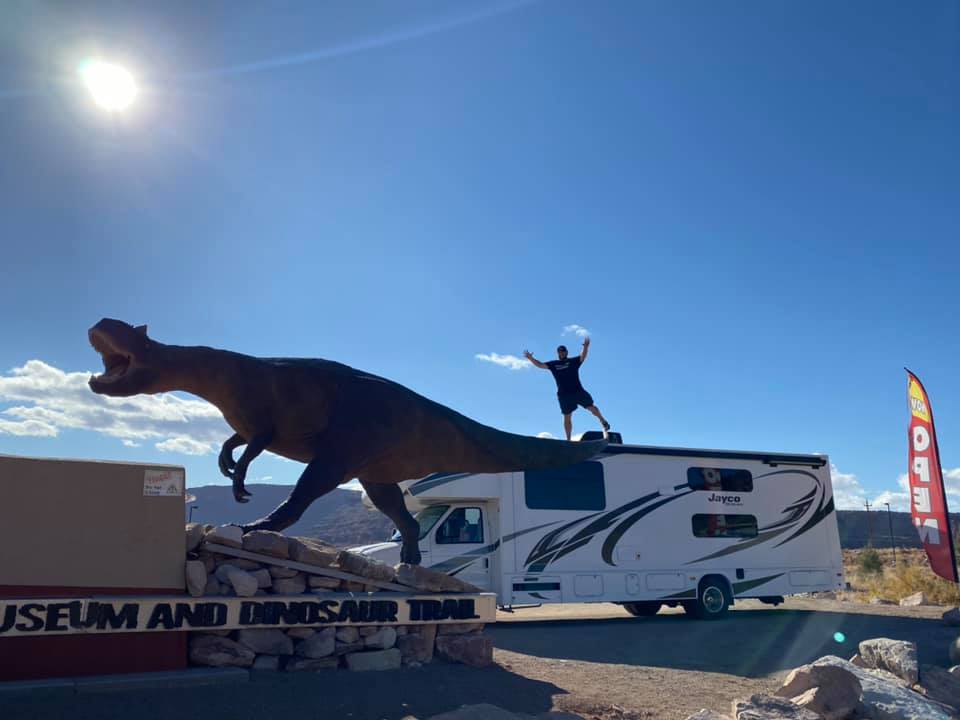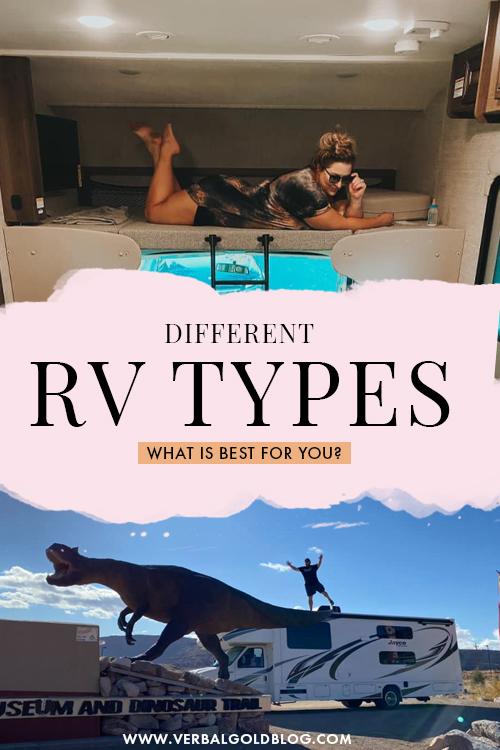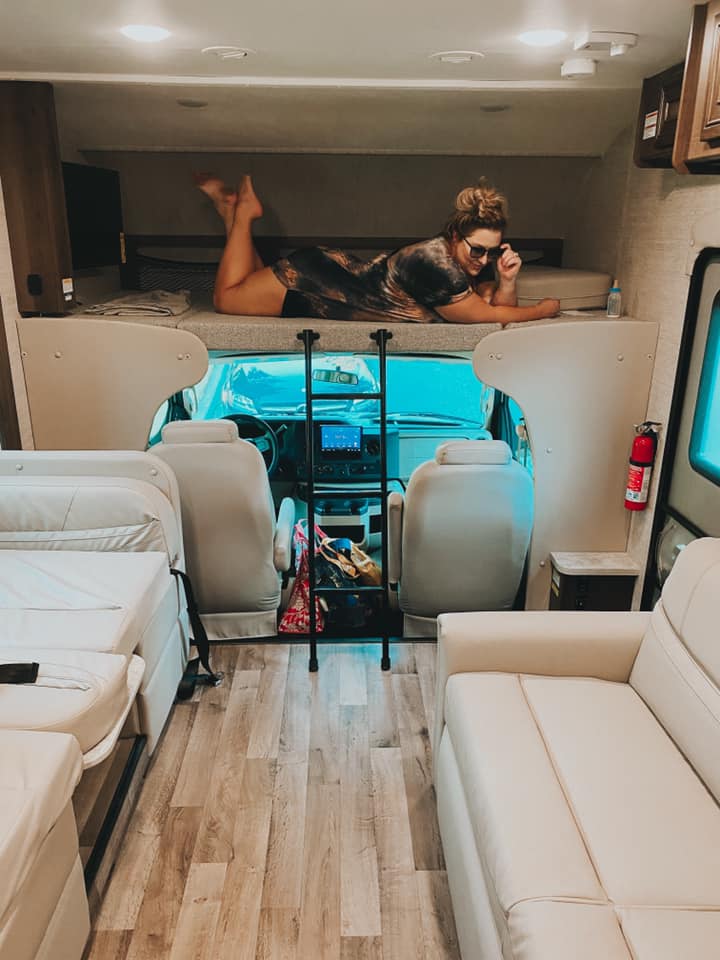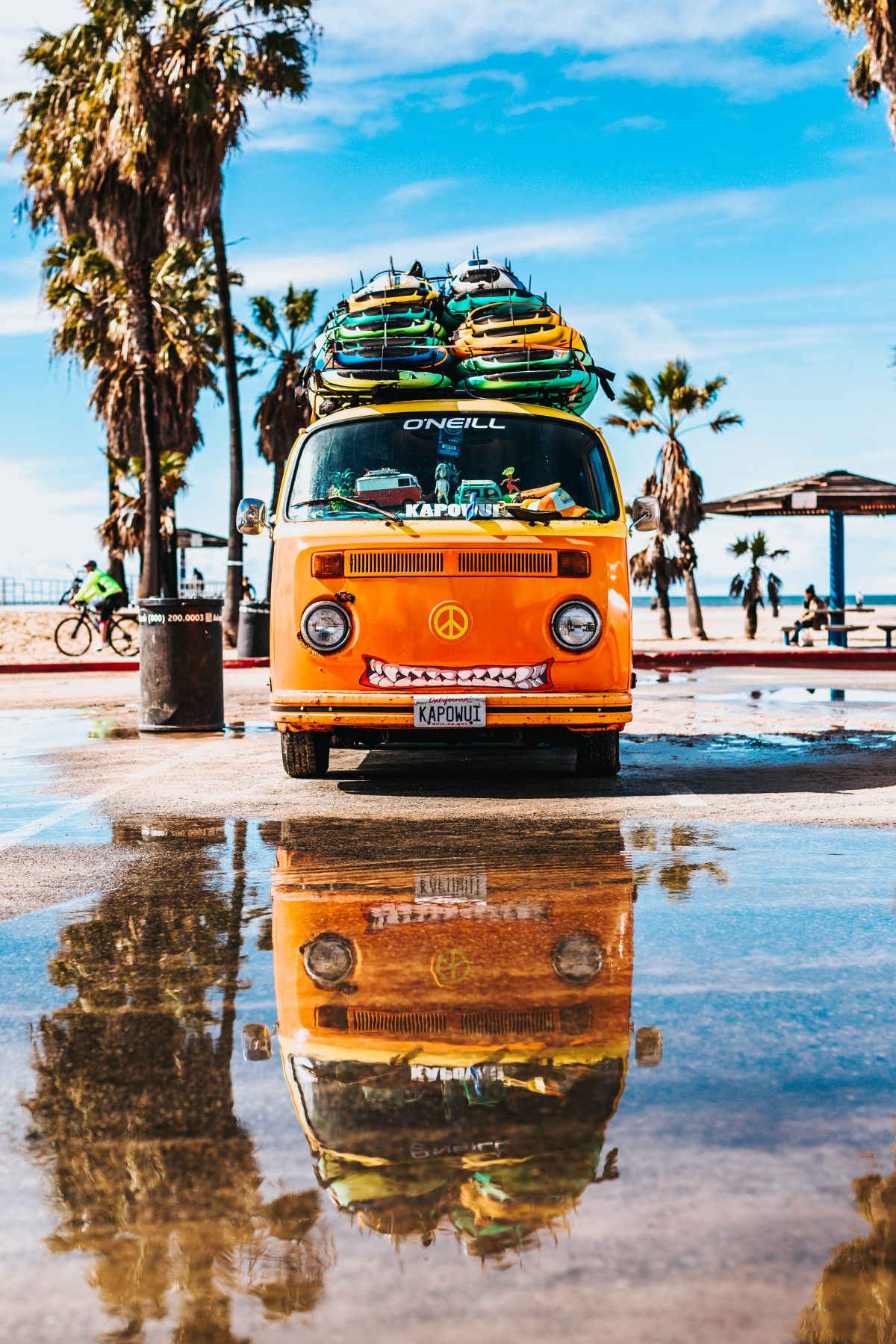
RV Types – What is best for you?

There are so many different RV types available (to rent or buy) that it can be hard to narrow down the best option for you. RVs fall into two main categories: motorhomes that can be driven and travel trailers that are towed behind a vehicle. In this article, we’ll break down the sub-types of RVs within these two categories and give you an idea of the best uses for each one.
Types of Motorhomes
Motorhomes range in size from small camper vans to 45-foot coaches. The classifications are as follows:
Class A
Class A motorhomes are the big boys, ranging from about 30 to 45 feet in length. These rigs usually feature the flat-front coach bus shape and have up to four slide-out sections to increase living space. The biggest Class As can sleep up to 10 people!
However, these rigs are extremely large and therefore heavy. That means fuel efficiency can be slashed dramatically down to about six miles per gallon. These are commonly diesel pushers, with a powerful engine situated in the back end of the vehicle. This provides more torque than a front engine and makes for a much quieter ride in the cockpit.
You’ll have everything you could possibly need in a Class A. From full-sized kitchen appliances to larger suite bedrooms to flat-screen TVs to a fireplace. You can expect a full bathroom and lots of built-in storage space as well.
Best Use: These massive RVs are quite luxurious and comfortable for extended stays and trips with large groups of people — or if you just enjoy camping in luxury!
Class B
You might think that logically, Class B RVs would be the next smallest size, but that’s not the case. Class Cs are the mid-sized rigs and Class Bs are the smallest. These are essentially manufactured campervans, often built on a Ford E-series or Mercedes Sprinter van chassis. They measure 20 to 25 feet in total length.
They may include a small slide-out and are generally equipped with small versions of everything you need. Including kitchen space, bathroom (usually a wet bath where the shower and toilet share a space), bed, and dinette. Class Bs often have clever space-saving elements like driver and passenger seats that swivel to face the living space, fold-away sinks in the wet baths, and couches that turn into beds.
The smaller size of these rigs means you will get better gas mileage. They are easier to drive and park, and you can navigate narrow and bumpy roads without stress. They are also more frequently equipped for off-grid use with solar panels and battery banks so you can boondock.
Best Use: These small RVs are best suited for solo travelers or couples who value capability and adventure over creature comforts. With a Class B, you can spend a few days camping in the wilderness and then drive through the city and easily park in most urban locations.

Class C
Class Cs are the happy medium, with easier maneuverability than a Class A but more space than a Class B. This type of motorhome is usually built on a truck chassis. They generally feature the distinctive cab-over look, with a bed or storage space directly over the truck cab. They range from about 20 to 40 feet long, with the longer options referred to as Super C RVs.
Class Cs often have at least one slide-out and many of the same amenities that you would find in a Class A. Like full bathrooms, several kitchen appliances, and enough sleeping space for a family or group of friends. They offer enough space to be comfortable while also fitting more easily into campsites.
Best Use: Class C RVs are great for family travel or a road trip with friends. The truck cab makes it feel more similar to driving a car but there is still enough space inside for multiple people to vacation comfortably.
This is the one we bought!

Campervans
The campervan category encompasses non-traditional and extra-small RVs. Think pop-top Volkswagen Westfalias, cargo van and mini school bus conversions, and even minivans and SUVs that have been equipped with camping gear. There are several companies that rent out basic campervans as well as platforms that allow DIY campervan owners to rent out their custom rigs. Campervans allow you the most versatility to go between city driving and adventuring, with the best fuel efficiency of any RV.
Best Use: Campervans are excellent for long-distance road trips for couples, small families, or groups of friends. They are versatile, easy to drive, and inexpensive in terms of fuel and rental fees when compared to larger RVs.
Types of Travel Trailers
There are also many different types of travel trailers available for rent. Most trailers require a beefy SUV or a truck to tow them. There are some extremely lightweight pop-up trailers that can be towed with a sedan. If you already own a capable tow vehicle, renting a trailer can be a more economic option than renting a motorhome. But if you plan to rent a tow vehicle and a travel trailer, the costs can add up.
It’s more difficult to drive while towing a rig when compared to driving a motorhome. However, it’s more convenient to be able to detach your travel trailer and leave it at your campsite while exploring in your tow vehicle.
Camper Trailer
This category includes tow-ables that are very similar in terms of layouts to motorhomes, just without engines. These trailers attach to vehicles with a standard bumper hitch and range from quite small teardrop trailers up to about 35 feet long. The interior options and layouts essentially mirror those of correspondingly sized motorhomes. They are significantly less expensive as well.
Best Use: Camper trailers are excellent for traveling with a family and especially for camping in one place for a long time, since you can unhook the trailer and go on mini-adventures or run errands in your tow vehicle.
Fifth Wheel
Fifth wheels are very similar in style to large camper trailers, but they attach to the tow vehicle differently. Rather than connecting to a bumper hitch, these trailers require a special hitch that sits in the bed of a heavy-duty pickup truck. These types of hitch systems can cost anywhere from $50 to over $1,000, but they provide much more stability when towing with less sway than bumper hitch trailers.
Fifth-wheel trailers can be super spacious though, with lengths up to about 40 feet. There is a raised forward section over the hitch attachment which provides an extra sleeping area. They can also have up to six slide-outs due to the massive length and no need for a driving cab.
Best Use: Fifth-wheel trailers are really only a good rental option if you already have a truck with a fifth-wheel hitch system. However, it’s unlikely that you would have a truck bed hitch system without already owning a fifth wheel, so they aren’t super practical for rentals. But, these are excellent options for long drives as they offer greater stability, but they can still be detached from the truck.
Pop-Up Camper
Pop-up campers fold down to small, low-profile boxes that are lightweight and easy to tow. Then deploy to be double or even triple the size when you are parked. These campers used to be basically glorified tents. Newer models have all kinds of amenities inside, like stoves, running water, and wet bathrooms.
The only downside is that you have to stow everything and pack up the camper each time you want to move it. However, they are affordable to rent and a definite step up from tent camping. Plus they can be towed by smaller vehicles.
Best Use: Pop-up campers are an inexpensive entry point into RV rentals. They are perfect for casual car camping as an upgrade from sleeping in a tent, which can be uncomfortable on rocky or uneven ground.
Toy Hauler
Toy haulers are trailers that are designed with large garage spaces in the back that can hold equipment like motorcycles, kayaks, dirt bikes, golf carts, four-wheelers, or any other large items that you want to bring with you on vacation. These are often fifth-wheel trailers since they are large and heavy, and they feature heavy-duty rear doors that fold down into a ramp to load gear. Toy haulers often still feature slide-outs in the front living portion of the trailer and have many of the same amenities you would find in any other fifth wheel.
Best Use: These trailers are excellent for heading to destinations or events where you’ll want to use large outdoor equipment because they combine the comfort of a luxury RV with the convenience and safety of hauling your gear inside the trailer. If you are headed to a motorcycle rally, a four-wheeling destination, or on a golfing tour, a toy hauler is a perfect solution.
Now that you have a better understanding of the different types of RVs, it will be easier for you to narrow down an RV for your next adventure.
Tell me … what adventure are you planning and which type of RV do you think will work best?
Want to travel the US in an RV? Become a renter
Already have an RV and want to make extra money while sharing your passion? Become an owner + List your RV on Outdoorsy!
Read Next:
3 GAS MILEAGE HACKS FOR YOUR RV | IMPROVE YOUR RV’S MPG
Ways to Have Fun Traveling With an RV



